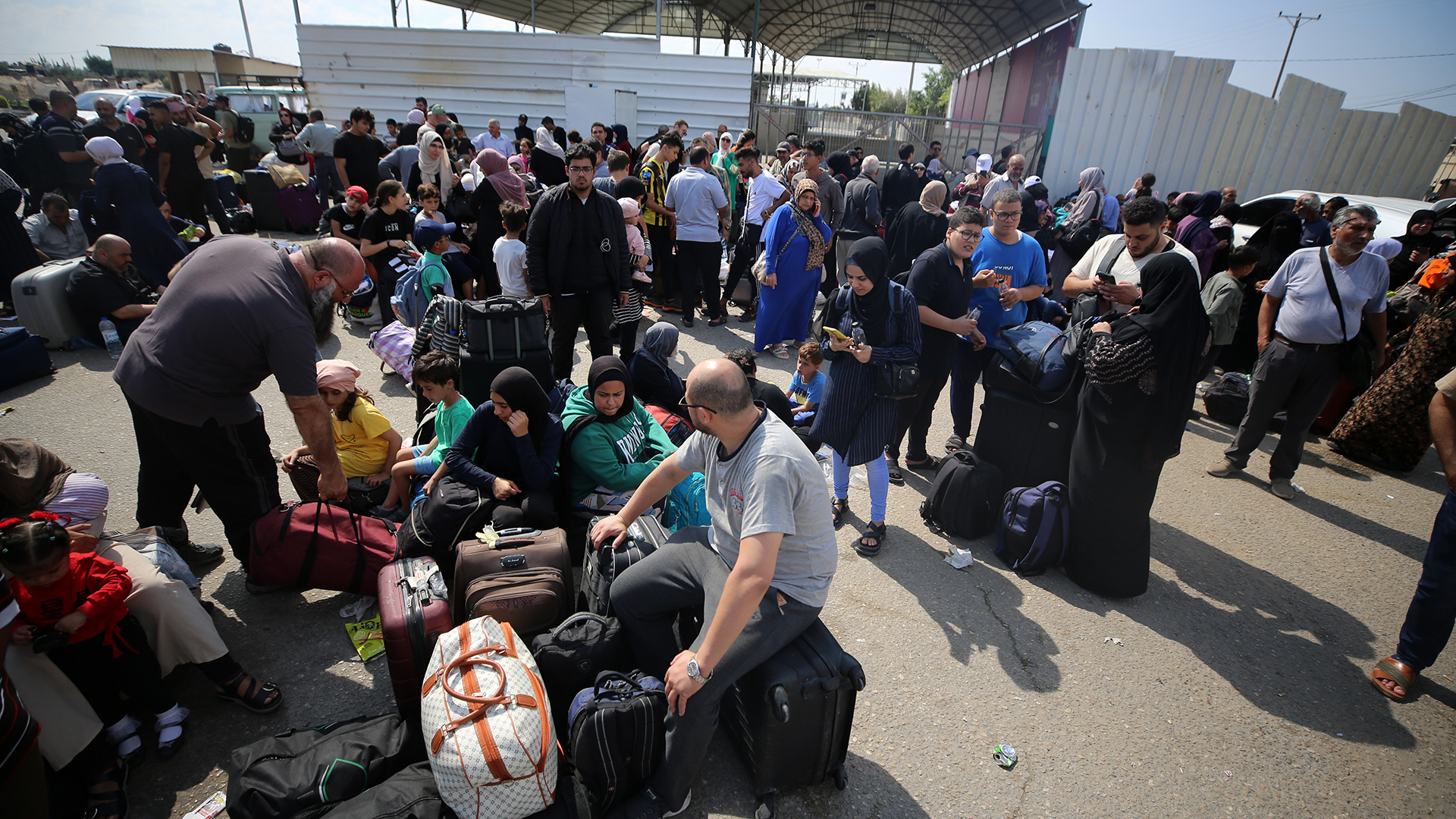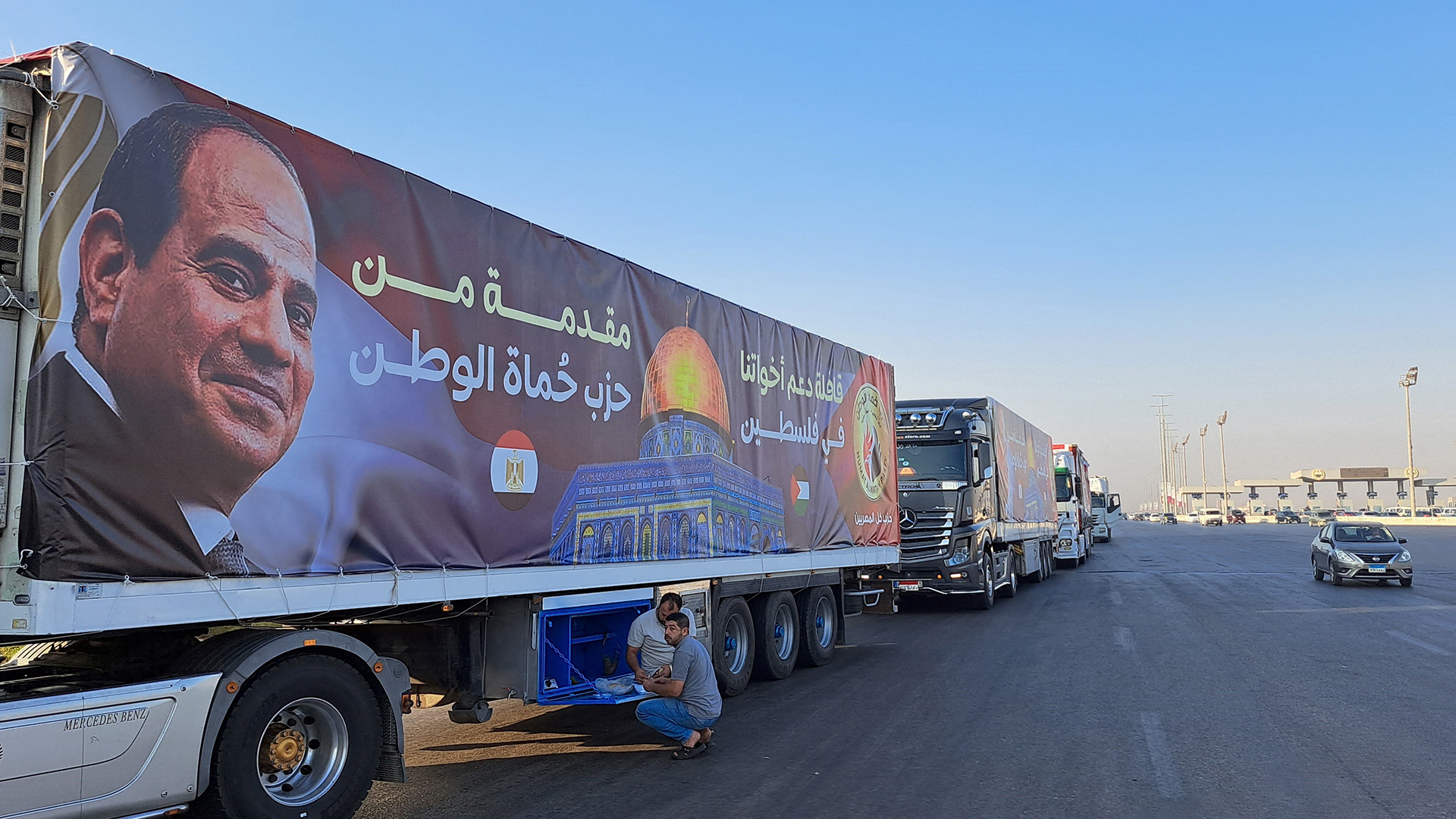Israel struck the Rafah crossing — the border checkpoint between Gaza and Israel — again Monday, according to The Wall Street Journal, as efforts at a temporary ceasefire in southern Gaza fell through. Meanwhile, Egypt said Israel was not cooperating with the delivery of aid into Gaza and evacuations of foreign passport holders via the only entry point from Gaza, and one that it does not wholly control, Reuters reported.
“Just before sunset, a parking lot near the Rafah border crossing on Gaza’s southern border, where hundreds had gathered hours earlier at the urging of the U.S. Embassy in Israel, was hit by a blast,” according to the Journal. “The blast hit an empty area, hurting no one but causing damage that could prevent the use of the crossing, officials from Egypt and Gaza said. An Israeli military spokesman said he didn’t immediately have any information about the attack.”

Israel Defense Forces spokesman Amnon Shefler said Israel has long had concerns about arms smuggling through the Rafah crossing by militant groups Hamas and Islamic Jihad, the Journal reported. He said Israel wouldn’t target a civilian convoy.
The lack of cooperation over aid by Israel has left hundreds of tons of supplies stuck, Egyptian officials said, according to Reuters. Israel had agreed to allow water trucks to enter the Gaza Strip via Egypt’s Rafah Crossing, but as of Monday that has yet to happen, Haaretz reported.
Cairo says the Rafah crossing is not officially closed but is inoperable due to Israeli air strikes on the Gaza side.
“There is an urgent need to alleviate the suffering of Palestinian civilians in Gaza,” Egypt’s Foreign Minister Sameh Shoukry told reporters, adding that talks with Israel had not been fruitful, Reuters reported.
“Until now the Israeli government has not taken a position on opening the Rafah crossing from the Gaza side to allow the entrance of assistance and exit of citizens of third countries.”
Additional Egyptian troops reportedly arrived at the crossing recently.
U.S. officials were still hoping that Rafah would operate for a few hours later on Monday, White House spokesman John Kirby said, noting that earlier hopes had been “dashed.”
The U.S. Embassy in Israel, anticipating an opening of the Rafah crossing, urged Americans trapped in Gaza to head that way.
“According to media reports, the Rafah crossing will open at 9 a.m. local time on October 16,” according to the embassy. “We anticipate that the situation at the Rafah crossing will remain fluid and unpredictable and it is unclear whether, or for how long, travelers will be permitted to transit the crossing. If you assess it to be safe, you may wish to move closer to the Rafah border crossing – there may be very little notice if the crossing opens and it may only open for a limited time.”
All this has apparently caused a great deal of confusion at the Rafah crossing.
As we reported yesterday, there was some indication that aid in the form of fuel trucks and other vehicles, which were flying the UN flag or painted with UN markings, was moving through Rafah crossing into Gaza. The actual status of those vehicles was murky last night as Israeli officials denied they approved the crossing open for any reason.
Now the IDF claims Hamas stole fuel and medical equipment from the The United Nations Relief and Works Agency for Palestine Refugees in the Near East (UNRWA). This very well could have been the vehicles that prompted may to assume the cross had been opened, even for just a very limited delivery at first.
In Gaza, the death toll continues to rise as Israel maintains its ferocious bombardment ahead of an expected ground offensive into the densely populated Palestinian enclave.
Residents said overnight air strikes were the heaviest yet, and the bombing carried on through the day, according to Reuters.
“We were inside the house when we found bodies scattering, flying in the air – bodies of children who have nothing to do with the war,” Gaza resident Abed Rabayaa told Reuters. His neighbor’s house in Khan Younis, the main city in the southern part of the enclave, was hit overnight, according to Reuters.
The Gaza Health Ministry said 2,670 Palestinians have been killed and 9,600 wounded since the fighting erupted, more than in the 2014 Gaza war, which lasted over six weeks, according to The Associated Press. That makes this the deadliest of the five Gaza wars for both sides.
The IDF claims the strikes are against military targets.
“In the last few hours, dozens of operational headquarters and mortar bomb launching positions were destroyed,” the IDF said. “In addition, the military headquarters of Ali Kachi, one of the commanders in the Najaba force of the terrorist organization Hamas, which was eliminated a few days ago, was destroyed.”
Gaza health officials say the death toll will grow even larger due to a lack of medical supplies as well as the ongoing shutoff of utilities ordered by Israel.
“Medics in Gaza warned Sunday that thousands could die as hospitals packed with wounded people ran desperately low on fuel and basic supplies,” the AP reported. “Palestinians in the besieged coastal enclave struggled to find food, water and safety.”
Despite repeated airstrikes Israel says is aimed at Hamas leadership and their ability to continue attacking Israel, Hamas continued to launch rockets and missiles across Israel. On Monday, Hamas said it launched attacks on Ashkelon, Beersheba, Ben Gurion Airport, Jerusalem and Tel Aviv.
More than 1,400 Israelis have been killed as well, the vast majority of them civilians, in Hamas’ Oct. 7 assault. At least 155 others, including children, were captured by Hamas and taken into Gaza, according to Israel. It’s also the deadliest war for Israel since the 1973 conflict with Egypt and Syria.
The head of the Shin Bet on Monday took responsibility for the intelligence failures that let to the attack.
In a message sent to Shin Bet workers and their families over the weekend, Ronen Bar wrote that “despite a number of actions we took, unfortunately, on Saturday we were unable to create enough early warning to prevent the attack,” AP reported.
U.S. Secretary of State Antony Blinken returned to Israel on Monday and met with Prime Minister Benjamin Netanyahu and President Isaac Herzog.
Blinken discussed continued U.S. security assistance to Israel as well as the need to provide humanitarian for Gazans and ongoing effort to seek the release of some 150 hostages being held bye Hamas, according to official readouts.
“The Secretary underlined his firm support for Israel’s right to defend itself from Hamas’ terrorism and reaffirmed U.S. determination to provide the Israeli government with what it needs to protect its citizens,” State Department spokesman Matthew Miller said in a statement Monday morning. “The Secretary discussed with Prime Minister Netanyahu the United States’ close coordination with the UN and regional partners to facilitate the provision of humanitarian aid to civilians. The Secretary also discussed our commitment to the safe and speedy release of those held hostage by Hamas.”
Blinken and members of the Israeli war cabinet were reportedly evacuated to a bomb shelter under Tel Aviv during a massive Hamas missile attack.
The Pentagon has selected about 2,000 troops to prepare for a potential deployment in non-combat roles to support Israel, U.S. defense officials told The Wall Street Journal. The troops are tasked with missions like advising and medical support, the officials said, adding they are from across the U.S. armed services. They aren’t intended to serve in a combat role, the officials said. No infantry have been put on prepare-to-deploy order.
The troops are currently stationed both inside the Middle East and outside, including Europe, the officials said. It isn’t clear under what circumstances the U.S. could deploy the troops or to where, but the Pentagon decision signaled it is preparing to support Israeli troops should Israel launch a ground incursion into Gaza.
The IDF posted video Monday of its newest missile ships in action.
The Sa’ar 6 class ships Ahi Oz and Ahi Magen “carried out attacks from the surface of the sea towards the Gaza Strip as part of the fighting,” the IDF reported. “As part of these attacks, a facility for the production of weapons, an outpost and an observation post of the naval force of the terrorist organization Hamas were attacked.” You can read more about these ships and what they bring to the table in our story here.
Israeli police say they have “arrested 63 suspects since the beginning of the war on suspicion of offenses of incitement and support for terrorism – indictments are expected in the coming days. The Jerusalem district police continue the increased operational preparation, while dealing with incitement to terrorism and violence.”
As we noted would happen yesterday, Israel officially ordered residents of nearly 30 communities close to the border with Lebanon to evacuate as the Israeli Defense Forces (IDF) continue to trade fire with Hezbollah.
The plan, implemented by the National Emergency Management Authority (NEMA) of the Ministry of Defense and the IDF, calls for the evacuation of “residents of northern Israel who live in the area up to 2 kilometers from the Lebanese border to state-funded guesthouses.”
“The 28 communities included in the plan are: Ghajar, Dishon, Kfar Yuval, Margaliot, Metula, Avivim, Dovev, Ma’ayan Baruch, Bara’m, Manara, Yiftach, Malkia, Misgav Am, Yir’on, Dafna, Arab al-Aramshe, Shlomi, Netu’a, Ya’ara, Shtula, Matat, Zari’t, Shomera, Betzet, Adamit, Rosh HaNikram, Hanita and Kfar Giladi,” the IDF said on its Telegram channel Monday.
After the order was issued, the IDF said its “soldiers operating along the Lebanese border were fired at. No IDF injuries were reported. The IDF is responding with artillery fire toward the source of the attack.”
The IDF also said that “an anti-tank missile was fired at an IDF tank. No IDF injuries were reported. The IDF is responding with artillery fire toward the origins of the fire.”
The continued cross-border firing comes a day after Israel said Iran had ordered Hezbollah to escalate its attacks against Israel.
The Lebanese army on Monday said search operations have led to the discovery of 20 rockets launchers near the Lebanon-Israel border, The Times of Israel reported Monday.
“The army says in a statement that four of the launchers discovered had rockets inside them and were ready to be fired at Israel,” the publication reported. “The army says military experts are working on dismantling the launchers, which were discovered near the village of Qlaileh, south of the port city of Tyre.”
Russian President Vladimir Putin is weighing in on the Israel-Hamas war.
Putin told Netanyahu on Monday that Moscow wanted to help prevent a humanitarian disaster in Gaza as he waded into the Middle East crisis with a flurry of calls to key regional players, Reuters reported.
Putin spoke to several other leaders in the region as well.
Iranian President Ebrahim Raisi told Putin in their conversation that supporting the Palestinians was Iran’s foreign policy priority but “resistance” groups made their own independent decisions, Iranian state media said according to Reuters.
They quoted Raisi as saying: “There is a possibility of the conflict between Israel and Palestinians expanding to other fronts.”
Putin also spoke to Syrian President Bashar al-Assad, Palestinan President Mahmoud Abbas and Egyptian President Abdel Fattah al-Sisi, whom he asked for assistance from Cairo in evacuating Russian citizens from Gaza, the Kremlin said.
This is a developing story and we will update it when there is more news to report.
Contact the author: howard@thewarzone.com
